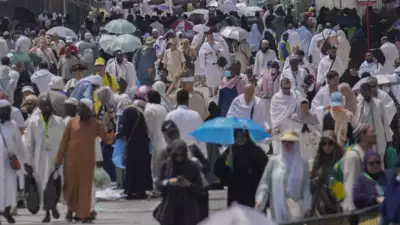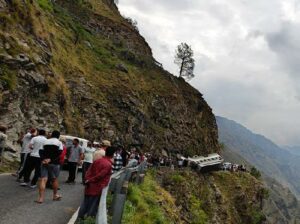Mina (Saudi Arabia), June 14
In sweltering temperatures, Muslim pilgrims in Mecca converged on a vast tent camp in the desert on Friday, officially opening the annual Hajj pilgrimage. Ahead of their trip, they circled the cube-shaped Kaaba in the Grand Mosque, Islam’s holiest site.
More than 1.5 million pilgrims from around the world have already amassed in and around Mecca for Hajj, and the number was still growing as more pilgrims from inside Saudi Arabia joined. Saudi authorities expected the number of pilgrims to exceed 2 million this year.
This year’s Hajj came against the backdrop of the raging war in the Gaza Strip between Israel and Palestinian militants, which pushed the entire Middle East to the brink of a regional war between Israel and its allies on one side and Iran-backed militant groups on the other.
Palestinians in the coastal enclave of Gaza were not able to travel to Mecca for Hajj this year because of the closure of the Rafah crossing in May when Israel extended its ground offensive to the strip’s southern city of Rafah on the border with Egypt.
Palestinian authorities said 4,200 pilgrims from the occupied West Bank arrived in Mecca for Hajj. Saudi authorities said 1,000 more from the families of Palestinians killed or wounded in the war in Gaza also arrived to perform Hajj at the invitation of King Salman of Saudi Arabia. The 1,000 invitees were already outside Gaza — mostly in Egypt — before closure of the Rafah crossing.
“We are deprived of (performing) Hajj because the crossing is closed, and because of the raging wars and destruction,” said Amna Abu Mutlaq, a 75-year-old Palestinian woman from Gaza’s southern city of Khan Younis who had planned to perform Hajj this year. “They (Israel) deprived us from everything.” This year’s Hajj also saw Syrian pilgrims travelling to Mecca on direct flights from Damascus for the first time in more than a decade. The move was part of an ongoing thaw in relations between Saudi Arabia and conflict-stricken Syria. Syrians in rebel-held areas used to cross the border into neighbouring Turkiye in their exhausting trip to Mecca for Hajj.
The pilgrimage is one of the five pillars of Islam, and all Muslims are required to make the five-day Hajj at least once in their lives if they are physically and financially able to do it.
It is a moving spiritual experience for pilgrims who believe it absolves sins and brings them closer to God, while uniting the world’s more than 2 billion Muslims. It’s also a chance to pray for peace in many conflict-stricken Arab and Muslim countries, including Yemen and Sudan, where more than a year of war between rival generals created the world’s largest displacement crisis.
For many Muslims, Hajj is the only major journey that they made in their life. Some spend years saving up money and waiting for a permit to embark on the journey in their 50s and 60s after they raised their children.
Saudi authorities have adopted security restrictions in and around Mecca, with checkpoints set up on roads leading to the city to prevent those who don’t have Hajj permits from reaching the holy sites.
Security authorities arrested many people who attempted to take pilgrims to Mecca who didn’t have Hajj permits, said Lt Gen Muhammad al-Bassami, head of Hajj Security Committee. Most of them were expelled from the country, while travel agents faced jail for up to six months, according to the Interior Ministry.
On Friday, the pilgrims made their way to Mina, officially opening the Hajj. They then will move for a daylong vigil Saturday on Mount Arafat, a desert hill where the Prophet Muhammad is said to have delivered his final speech, known as the Farewell Sermon. Healthy pilgrims make the trip on foot, others use bus or train.
Most of the Hajj rituals are held outdoors with little if any shade. When it falls in the summer months, temperatures can soar to over 40 degrees Celsius (104 Fahrenheit). The health ministry has cautioned that temperatures in the holy sites could reach 48 degrees Celsius (118 Fahrenheit). Many pilgrims carried umbrellas against the burning sun.
After Saturday’s warship in Arafat, pilgrims will travel a few kilometres (miles) to a site known as Muzdalifa to collect pebbles that they will use in the symbolic stoning of pillars representing the devil back in Mina.
In recent years, the annual pilgrimage has returned to its monumental scale after three years of heavy restrictions because of the coronavirus pandemic. Last year, more than 1.8 million pilgrims performed Hajj, approaching the 2019 level when more than 2.4 million pilgrims participated in the pilgrimage.













